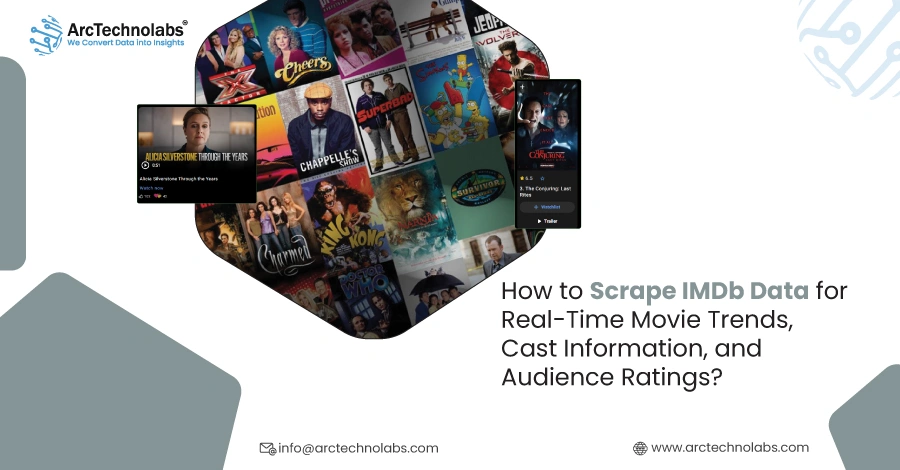
Introduction
The entertainment industry is rapidly evolving, and audience preferences change almost daily with the release of new movies, web series, and documentaries. For analysts, researchers, and businesses in the media sector, having structured data is crucial for interpreting viewing trends and consumer behavior. Platforms like IMDb have become a global standard for collecting authentic information on movies, TV shows, casts, directors, and reviews. However, manually gathering this data is time-consuming and often inconsistent.
This is where a systematic approach to Scrape IMDb Data provides value. By applying the proper techniques, one can extract ratings, box office performance, cast lists, crew details, reviews, and popularity indexes in real time. Whether for market research, academic projects, or entertainment analytics, automated scraping brings accuracy and efficiency into the data collection process.
This blog offers a step-by-step IMDb Data Scraping Tutorial, designed to address common challenges such as structured extraction, filtering, and handling large datasets. It also explains the role of advanced scraping methods and tools, including alternatives to APIs and Python-based solutions. With tables, statistics, and practical insights, you’ll understand how structured IMDb datasets can fuel decision-making and trend forecasting for the global film industry.
Key Benefits of Scraping IMDb Data for Businesses and Researchers
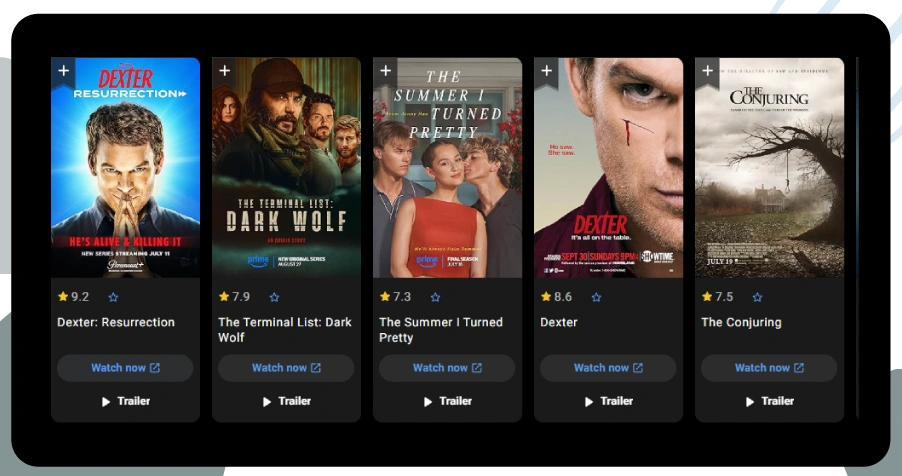
IMDb is the world’s largest movie and television database with over 12 million titles and more than 80 million registered users contributing reviews and ratings. Businesses, production houses, and research firms require structured datasets to analyze performance and develop effective strategies.
The significant benefits of Scrape IMDb Data include:
- Collecting structured movie details such as cast, crew, and release dates.
- Understanding real-time audience sentiment via ratings and reviews.
- Extracting historical trends for comparing past vs. present market performance.
- Analyzing global reach by filtering regional movie databases.
Example Table
| Movie Title | Release Year | IMDb Rating | Votes Count | Box Office (Approx) |
|---|---|---|---|---|
| Oppenheimer | 2023 | 8.4/10 | 820,000+ | $950M |
| Barbie | 2023 | 7.1/10 | 600,000+ | $1.4B |
| Dune: Part Two | 2024 | 8.8/10 | 220,000+ | $700M |
Statistics show that IMDb ratings influence nearly 74% of global streaming viewers when choosing what to watch. Businesses can’t afford to rely on guesswork when structured, real-time insights are available. This is where data scraping brings transparency and actionable intelligence.
Additionally, scraping helps to Extract Movie Data From IMDb in bulk for academic research, brand sentiment analysis, and entertainment marketing campaigns. Analysts can also compare how audience behavior changes across geographies or genres.
By harnessing structured IMDb data, production companies and streaming services get clarity on what kind of content resonates most, ensuring a data-backed approach to decision-making.
Stepwise Process to Collect Accurate IMDb Information Efficiently
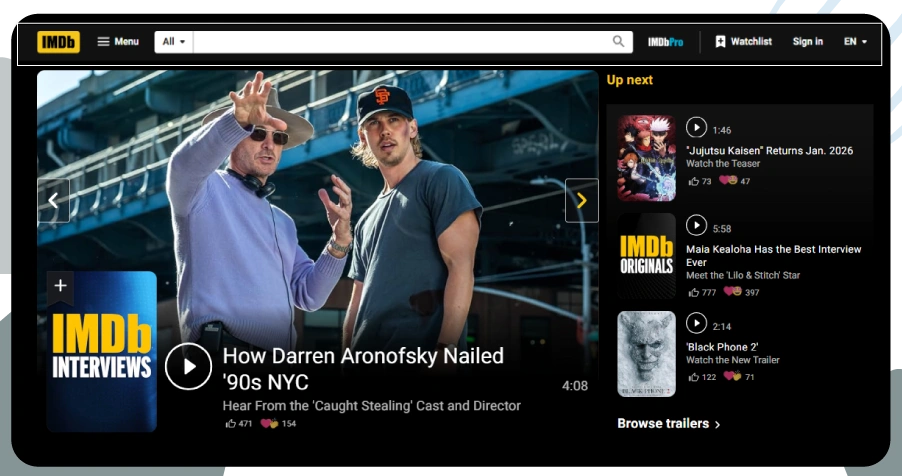
Collecting IMDb information requires a structured approach to ensure accuracy, scalability, and relevance. Below is a stepwise guide to help businesses or researchers collect actionable datasets:
- Define objectives – Decide whether the focus is on ratings, reviews, cast, crew, or a combination of all.
- Select scraping tools – Choose between open-source scraping frameworks or custom solutions.
- Target structured URLs – Movie pages, top charts, and genre-specific lists provide data endpoints.
- Parse HTML efficiently – Libraries like BeautifulSoup and Scrapy are widely used.
- Automate schedules – Set recurring crawls for real-time updates.
- Clean and validate datasets – Ensure duplicates and inconsistencies are removed.
Example Stats
- Around 60% of entertainment analytics firms automate IMDb scraping for regular updates.
- Bulk collection of data helps reduce manual workload by 85%, increasing accuracy.
For users who need a simplified learning process, a structured IMDb Data Scraping Tutorial provides an excellent foundation to apply scraping with minimal coding experience.
A common challenge is that IMDb restricts direct API access for some datasets. In such cases, businesses often look for an IMDb API Alternative to achieve broader extraction. Scraping scripts serve as a reliable replacement, offering greater flexibility for niche requirements.
When automated properly, datasets can highlight not just top-grossing movies but also rising talents, underdog films, and shifting genre popularity. The clarity helps in building effective marketing campaigns, generating content recommendations, and conducting academic studies. With a stepwise process, scraping IMDb becomes a repeatable and scalable solution for anyone aiming to stay updated with dynamic movie trends.
Extracting IMDb Ratings, Reviews, and Audience Sentiment Data
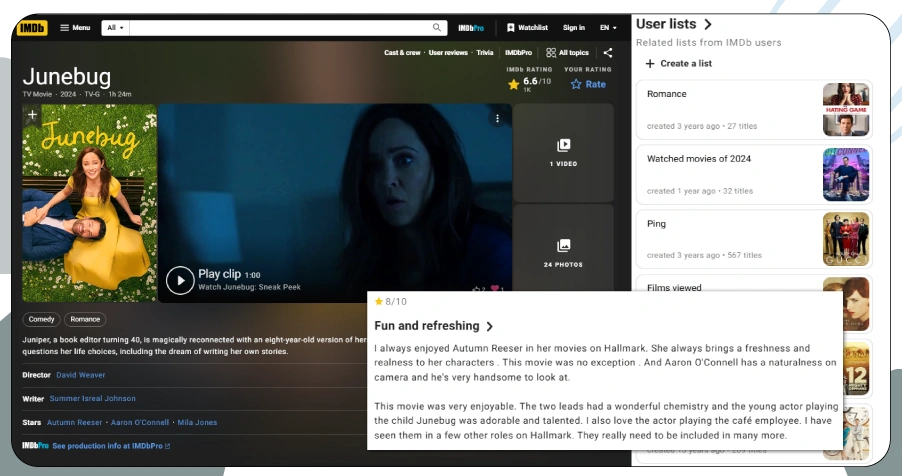
Audience perception plays a decisive role in shaping a movie’s long-term success. With more than 1 billion monthly visits, IMDb reviews and ratings provide a goldmine of user-generated insights.
When businesses decide to Scrape IMDb Ratings and Reviews 2025, they can extract multiple layers of information:
- Average star ratings (1–10 scale).
- Review sentiment (positive, neutral, negative).
- Number of votes and credibility scores.
- Reviewer demographics (when available).
Data Table Example:
| Movie Title | Avg. Rating | Positive Reviews | Negative Reviews |
|---|---|---|---|
| The Batman | 7.8/10 | 71% | 29% |
| Avatar 2 | 7.6/10 | 65% | 35% |
| Joker | 8.5/10 | 82% | 18% |
According to recent statistics, 82% of users check IMDb reviews before watching new releases, underscoring the significant influence of these reviews. By scraping this data, media companies and research groups gain a clear view of shifting audience moods. For example, if ratings for a newly released film drop by 1.5 points in two weeks, production companies can investigate whether this is due to dissatisfaction with the storyline, criticism of actor performance, or competing releases.
Instead of relying on random sampling, large-scale scraping ensures the creation of unbiased datasets. This is where building a Python Script to Scrape IMDb becomes a powerful tool. Automation can collect thousands of reviews in minutes, compared to manual collection, which may take days. The ability to process and visualize reviews enables marketing teams to understand fan loyalty, the impact of critics, and sentiment shifts over time. This predictive power enables data scraping to become a competitive advantage.
Using Python for Advanced IMDb Movie Database Scraping
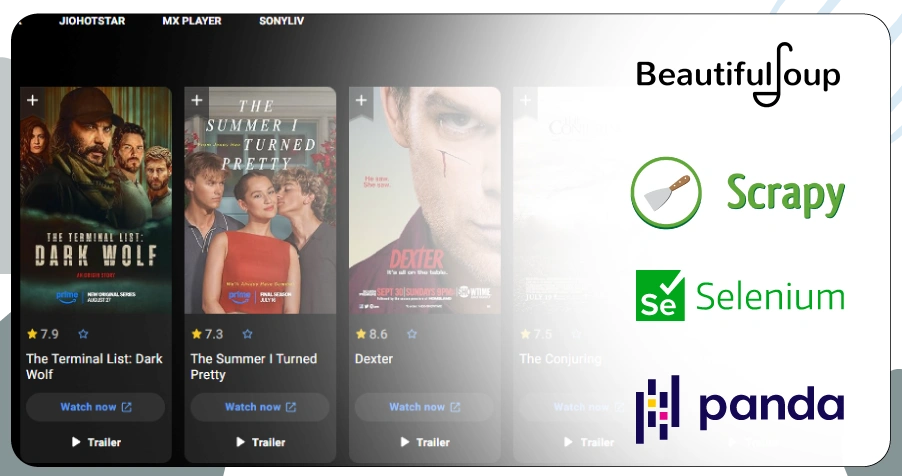
Python has become the preferred programming language for scraping due to its flexibility and broad library support. With thousands of developers using it daily, Python facilitates smooth and efficient data extraction from dynamic websites, such as IMDb.
For large-scale Movie Database Scraping With Python, users often rely on libraries such as:
- BeautifulSoup – Ideal for parsing static HTML pages.
- Scrapy – Best for large-scale crawling projects.
- Selenium – Handles dynamic pages requiring JavaScript rendering.
- Pandas – Stores and cleans datasets for analytics.
Sample Table of Libraries:
| Python Library | Use Case | Difficulty Level |
|---|---|---|
| BeautifulSoup | Small-scale HTML parsing | Easy |
| Scrapy | Enterprise-level scraping | Medium |
| Selenium | Handling dynamic JS websites | Medium |
| Pandas | Cleaning, filtering, analytics | Easy |
A typical project using Python involves identifying URLs, setting up parsing rules, and storing structured data in formats such as CSV or JSON. Many advanced scripts also integrate machine learning models for sentiment analysis on reviews.
Python’s ecosystem allows real-time integration with dashboards, making it easier for businesses to visualize insights. This helps in predicting future trends, evaluating competition, and optimizing marketing campaigns.
For researchers, Python is cost-effective since open-source tools eliminate dependency on third-party software. Moreover, advanced scheduling scripts ensure Real-Time IMDb Data Extraction, which is critical when movie rankings change rapidly during release weekends. Therefore, Python not only simplifies data collection but also makes it scalable, adaptable, and analysis-friendly for modern entertainment needs.
Analyzing IMDb Top Movies, Cast Information, and TV Shows
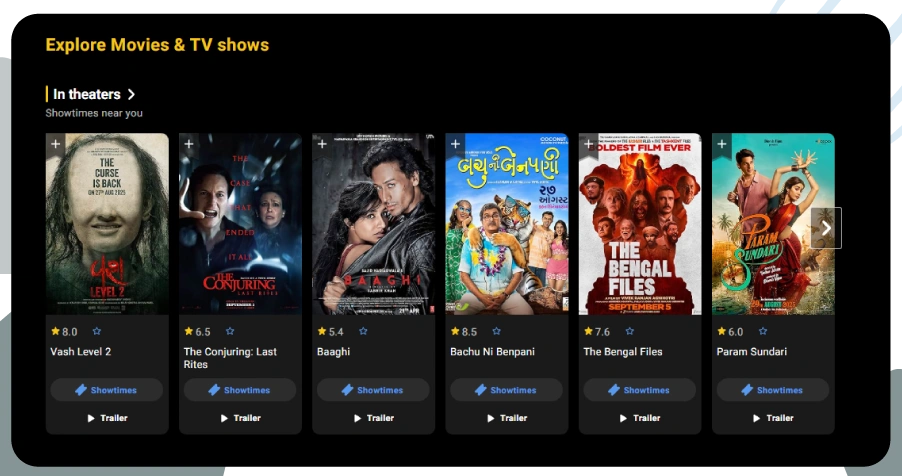
IMDb isn’t just a movie database—it covers global television, documentaries, and miniseries as well. Entertainment companies need full-spectrum visibility across these categories.
When businesses plan to Scrape Top Movies and TV Shows, they gain insights into:
- Highest-grossing box office hits.
- Audience-preferred TV shows across regions.
- Emerging actors are gaining traction.
- Comparative performance of franchises.
Example Table
| Category | Title | IMDb Rating | Votes Count |
|---|---|---|---|
| Top Movie | Oppenheimer | 8.4/10 | 820,000+ |
| Top TV Show | The Last of Us | 8.9/10 | 430,000+ |
| Top Series | Breaking Bad | 9.5/10 | 2M+ |
According to reports, streaming giants rely on IMDb rankings for 70% of their content recommendation algorithms. This makes scraped IMDb datasets invaluable for content acquisition strategies.
For example, if a streaming service identifies a foreign-language series trending on IMDb, it can expedite licensing negotiations to capitalize on audience interest before competitors. Similarly, identifying popular actors across TV shows helps in talent acquisition and collaborations.
Scraping cast information is equally important. Fans often follow actors more than franchises, and tracking their popularity trends can reveal new opportunities. For instance, actors emerging from more minor TV roles often experience exponential growth after a breakthrough role. By using structured datasets, businesses transform IMDb information into predictive models that forecast what content types will dominate viewership.
Applying IMDb Dataset for Analytics, Predictions, and Insights
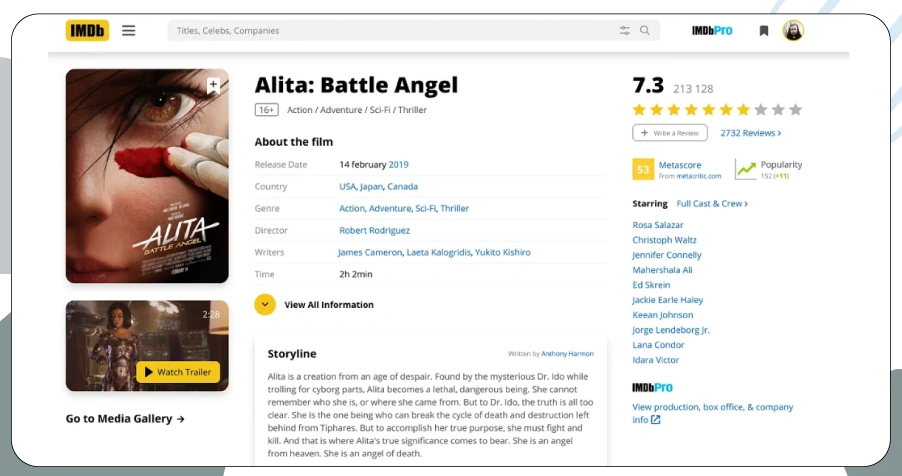
Data is only valuable when properly analyzed and interpreted. A structured IMDb Dataset for Analytics enables predictive modeling, competitive benchmarking, and strategic planning.
Organizations use analytics on scraped data for:
- Market predictions: – Understanding what genres are growing.
- Content recommendations: – Building AI-based personalization.
- Revenue forecasts: – Estimating potential box office outcomes.
- Competitor analysis: – Tracking rival studios and streaming services.
Example Stats:
- Predictive models built on IMDb data can improve forecast accuracy by 65%.
- Streaming platforms that utilize scraped datasets report a 30% higher customer retention rate due to personalized recommendations.
For businesses, datasets highlight not only present performance but also future possibilities. By analyzing box office numbers, audience ratings, and critical reviews, organizations can accurately predict the lifetime performance of films before their release.
Scraping also helps in creating trend-based reports. For example, by analyzing a decade of IMDb data, one can notice shifts in audience interest—from superhero dominance in the 2010s to original sci-fi concepts in the 2020s. Moreover, with automation in place, businesses can continuously refresh reports, ensuring decisions are based on the latest available information.
When combined with visualization dashboards, structured IMDb scraping turns raw data into easy-to-digest insights. This bridges the gap between market unpredictability and data-driven clarity.
How ArcTechnolabs Can Help You?
We simplify the process to Scrape IMDb Data: by offering scalable, reliable, and fully automated solutions tailored to entertainment businesses, researchers, and analytics firms. Our expertise ensures that clients gain access to structured, real-time datasets that cover ratings, reviews, box office performance, and cast insights.
Our services stand out because we design customized workflows that adapt to each client’s unique needs. Whether the requirement is academic research, competitive intelligence, or audience sentiment studies, we ensure accuracy and timeliness in data delivery.
- Automated pipelines for large-scale movie and TV datasets.
- Scalable infrastructure for handling millions of records.
- Compliance-focused data extraction methods.
- End-to-end solutions from scraping to analytics.
- Seamless integration with your existing tools.
- Dedicated support for continuous improvement.
By choosing us, clients don’t just get raw data—they receive actionable intelligence that drives real outcomes. With expertise in Real-Time IMDb Data Extraction, we help organizations stay competitive in an industry where timing is everything.
Conclusion
The need to Scrape IMDb Data has become indispensable for businesses, analysts, and entertainment companies aiming to decode shifting audience preferences. From ratings to reviews and cast details, structured data offers clarity and confidence in decision-making.
For those seeking future-ready strategies, using an IMDb API Alternative ensures flexibility and broader extraction possibilities. By combining scraping with analytics, organizations transform raw data into actionable insights that enhance customer satisfaction and drive market outcomes.
Start your journey with ArcTechnolabs today and transform IMDb data into actionable intelligence that drives success.







